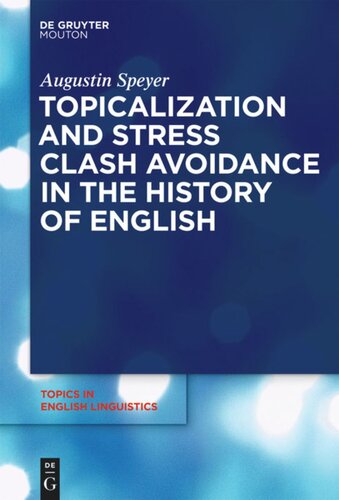

Most ebook files are in PDF format, so you can easily read them using various software such as Foxit Reader or directly on the Google Chrome browser.
Some ebook files are released by publishers in other formats such as .awz, .mobi, .epub, .fb2, etc. You may need to install specific software to read these formats on mobile/PC, such as Calibre.
Please read the tutorial at this link: https://ebookbell.com/faq
We offer FREE conversion to the popular formats you request; however, this may take some time. Therefore, right after payment, please email us, and we will try to provide the service as quickly as possible.
For some exceptional file formats or broken links (if any), please refrain from opening any disputes. Instead, email us first, and we will try to assist within a maximum of 6 hours.
EbookBell Team

5.0
48 reviewsThe book is concerned with the interaction of syntax, information structure and prosody in the history of English, demonstrating this with a case study of object topicalization. The approach is data-oriented, using material from syntactically parsed digital corpora of Old, Middle and Early Modern English, which serve as a solid foundation for conclusions.
The use of object topicalization underwent a sharp decline from Old English until today. In the present volume, a basic prosodic well-formedness condition, the Clash Avoidance Requirement, is identified as the main factor for this change. With the loss of V2-syntax, object topicalization led more easily to cases in which two focalized phrases, the topicalized object and the subject, are adjacent. The two focal accents on these phrases would produce a clash, thus violating the Clash Avoidance Requirement. In order to circumvent this, the use of topicalization in critical cases is avoided.
The Clash Avoidance Requirement is highly relevant also today, as experimental data on English and German show. Further, the Clash Avoidance Requirement helps to explain the well-known syntactic structure of the left periphery in Old English. An analysis positing two subject positions is defended in the study. The variation of these subject positions is shown to depend not on pronominal vs. lexical status of the subject but on information structural properties.